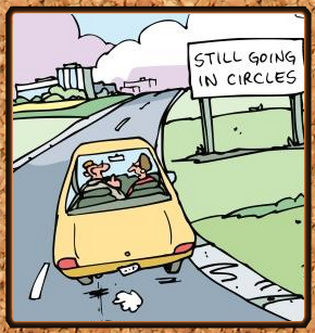I was sitting in yet another deal review. The sales person was describing the deal, focusing on what the customer wanted to buy.
The sales person described the products, the volumes, the competition, potential pricing…..
At some point, I raised my hand, asking, “Why are they buying?”
The sales person looked at me, perhaps noticing by silver hair, thinking, “Poor old guy, doesn’t realize senility is setting in, I’ll humor him.” He responded, “Because they are unhappy with their current supplier and want to look at alternatives?”
I persisted, “Why are they unhappy with their current supplier?”
The sales person couldn’t answer.
I continued, “Why are they experiencing problems with the supplier? What are the problems are they experiencing? What is the impact of those problems? What happens if they don’t make a change? Is it the competitor’s product that is causing problems, or is it something else?”
The sales person couldn’t answer. He looked at me, frustrated, I was slowing down the deal review…
I shifted gears, “What are they looking for in the alternatives?”
The sales person cheered up, “They are looking for a product that meets their needs and their price expectations, and ours will…..”
“But what are their needs?”
The sales person was getting frustrated, we seemed to be going in circles. “Well, they need our product….”
“But, presumably the current product meets their needs, what’s changed?”
Yes, we were going in circles—and the sales person kept focusing on the product he was selling.
Finally, I asked, “What do you need to do to win?”
The sales person was being kind, undoubtedly thinking, “It’s a shame when these old guys just keep asking these questions, going in circles….”
“We just have to come in at the right price, we have to be lower than their current supplier…..”
To which, I replied, “Is that what is causing the customer to be unhappy? What is it that we need to do to win?”
And the sales person couldn’t answer……..

I’ve often told the story about my oldest son who, eschewing the “filthy lucre” career path his father had taken (which of course, is absolutely fine), has become a well-respected Professor of Anthropology– with a specialty (among many other things) in Papua New Guinea, where he did his fieldwork.
I’m fascinated with his work, and one time asked him, “How do you come to REALLY understand a particular behavior in a particular culture.”
He replied, “Well Dad, we anthropologists use what I call the ‘Why Tree’. I observe something of interest and ask ‘why do you do that?’ Whatever the answer is, I ask, ‘hmm, why is that?’ Again regardless of the answer, I ask another variation of a ‘why’ question. I continue until they describe an emotion– usually based in love or fear, but including frustration, disappointment, hope, etc. Once I get THAT answer, I know WHY they do what they do….”
I said, “That’s really interesting! Ironically, that’s the exact same process I follow in doing business with customers, clients, partners, investors, employees, etc…”
David, you just “Why Tree’d” the sales exec!
Thanks Kurt! There’s actually a formal tool, called the 5 Why’s. It’s what your son does. I did it, wrapping a bit of a story around it. 😉